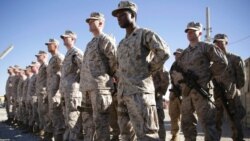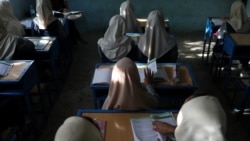The Taliban said Saturday that a failure by the United States to recognize their government in Afghanistan would prolong multiple crises facing the country and it could eventually turn it into a problem for the world.
The Islamist group regained control of the country in August and established an interim government in Kabul after U.S.-led NATO troops withdrew from the country, ending nearly 20 years of involvement in the Afghan war.
But the global community in general has not granted legitimacy to the Taliban administration and has blocked its access to about $10 billion in Afghan assets parked largely with the U.S. Federal Reserve, even as Afghanistan faces a deepening humanitarian crisis and prospects of an economic meltdown.
“Granting recognition to the current system is the right of Afghans and no one can deprive us of this right nor will it benefit anyone,” Taliban spokesman Zabihullah Mujahid told a news conference in Kabul.
“Our message to America is, if non-recognition prolongs, problems of Afghanistan prolong, it is the regional problem and could eventually become a problem for the world,” Mujahid said. He noted that in a meeting in Qatar earlier this month, Taliban leaders conveyed the same message to U.S. officials.
“We are hoping they will consider it and, God willing, this issue will be resolved," he added.
2001 invasion
While reiterating Kabul’s call for unfreezing Afghan assets abroad, Mujahid insisted the reason the Taliban and the United States went to war 20 years ago was the absence of bilateral diplomatic ties and recognition of the Taliban government at the time.
The U.S.-led military coalition invaded Afghanistan following the deadly September 2001 terrorist attack on America. It ousted the then-Taliban government for refusing to hand over al-Qaida chief Osama bin Ladan, whom Washington accused of planning the attack.
“Those issues could have been resolved through negotiations, through a political compromise and could have prevented the ensuing, utterly exhausting 20 years of war," Mujahid said.
The Taliban spokesman said they have also conveyed to Washington their desire to see the U.S. embassy in Kabul reopen and resume normal diplomatic activities.
While the U.S.-led Western countries have shut their embassies in Kabul after the Taliban takeover of the country, some of Afghanistan’s neighbors and regional countries, including China, Pakistan, Iran, Turkey and Russia, have kept their diplomatic missions open and held direct high-level meetings with Taliban officials in Afghanistan and abroad.
Taliban pledges
The Islamist group is under pressure to live up to its public pledges of protecting rights of Afghan women and minorities.
Under the previous five-year Taliban rule, women were barred from leaving their home unaccompanied and girls could not receive an education, among other human rights abuses, leaving Kabul internationally isolated at the time.
The Taliban have allowed boys to attend grades 6 to 12, but they have prevented girls in the same grades from resuming their education, saying regulations and arrangements are being put in place to ensure a safe environment for female students.
Mujahid said Saturday that young girls in many Afghan provinces have returned to school and the issue is gradually being resolved for others across the country.
“But we will not give this right to foreigners to direct us about how our girls should undertake educational activities. That is an internal Afghan matter,” he said.
“We are part of the global community and we have fulfilled all the conditions required for the world to formally recognize our government,” Mujahid insisted.
“There are issues in numerous countries vis-a-via international laws, but [those countries] have been formally recognized,” he said. “They have no democratic systems, they have dictatorships, kingdoms and other ruling systems. Why have they been recognized and why are conditions being set for us?”
UN says aid is urgent
The United Nations has been urging the global community to send urgent humanitarian assistance to Afghanistan, saying more than four decades of deadly conflicts and recurrent natural disasters have resulted in a protracted food crisis in the country.
A new U.N. study said this week humanitarian needs have grown to unprecedented levels, and more than half of the conflict-torn country’s estimated 40 million people will "face acute food insecurity" by November.
Washington announced on Thursday it is providing nearly $144 million in new humanitarian aid to Afghanistan, bringing the total U.S. relief assistance in Afghanistan and for Afghan refugees in the region to nearly $474 million in 2021, the largest amount of assistance from any nation.






